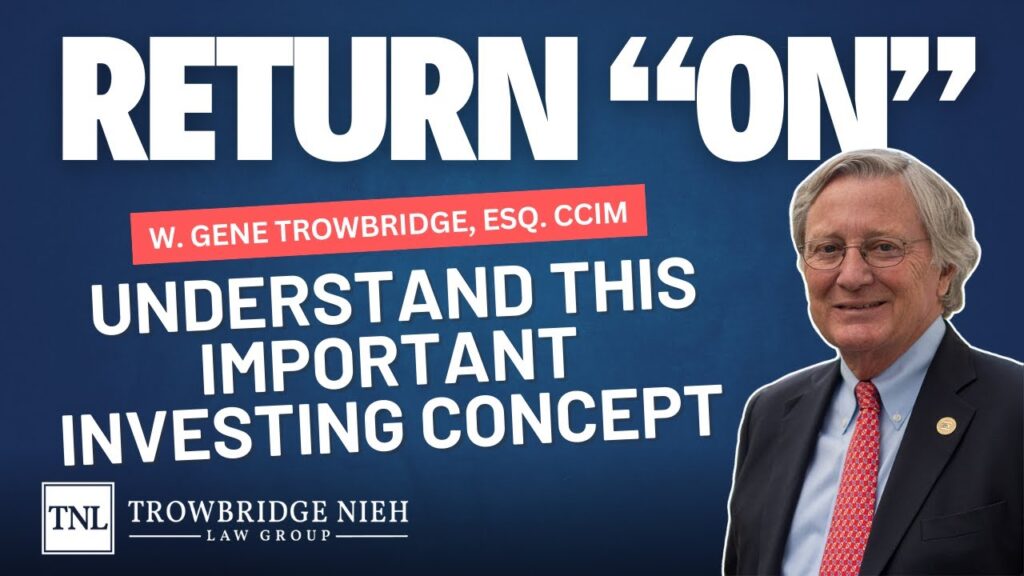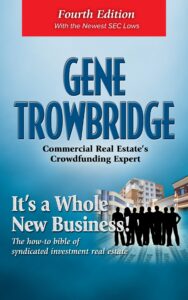Paying People to Raise Money for You – TBD with TLG #3
Can You Pay People to Raise Money for You?
In this episode of TBD with TLG, syndication attorneys Gene Trowbridge and Jonathan Nieh discuss whether syndicators should be paying people to find investors for their deals.In this episode, syndication attorneys Gene Trowbridge and Jonathan Nieh discuss when and how syndicators should conduct their capital calls with their investors.
Transcript
 | GT | - Hello everyone, welcome to TBD by TLG. This is Gene and my partner Jonathan is here. We're happy to say hi to you. I just wanna point out that we're both wearing Hawaiian shirts today, and it's kind of in mourning. The entire office has been bracing and training to go to Kauai in September to run the Kauai Half Marathon; and as of yesterday, the half marathon has been postponed for a year because of COVID. And so we're not gonna be able to do that race. Whether we're going to be able to go to Kauai anyhow is up for grabs. But maybe, Jonathan, I think there was some talks that maybe we would try to transfer all of our running skills to the Temecula Half Marathon in November. Is that right? |
 | JN | - Yeah, we might do that one or we might do a virtual marathon. |
 | GT | - Right, I can do a virtual half marathon if it doesn't involve running. |
 | JN | - Me too. |
 | GT | - I could do that for sure. So let's get started now. Our topic today is, we just finally determined what it would be, I know we don't wanna be too far ahead of ourselves. |
 | JN | - Just a second. |
 | GT | - Our topic today is can you pay people to raise money for you? And what we're talking about is we're talking about in a securities offering, someone's got to raise money from investors. So the question that we get all the time is can I, as a sponsor, pay other people to raise money for me? So Jonathan, why don't you start out and give us the good or bad news here? |
 | JN | - Well, I mean, good or bad news I guess. This is probably bad news for most people, right? The reason why we're doing this is because we're gonna tell you that you shouldn't pay people to raise money for you. I think that's what we normally tell our clients, right, Gene, is you should raise your money yourself. But the general rule is if you're in the business of raising money, if you're in the business of selling securities, you need to have a license; you need to be licensed to sell securities. So I think there's two main, I guess, governing bodies that control who has a license and how to get a license. The first one is FINRA. I forget what FINRA stands for, but it's like financial institutions, right? They regulate financial institutions. I think some of the licenses you get under FINRA are Series 6, Series 7, stuff like that. And the other one is the NASAA, right, Gene? I forgot what it stands for. |
 | GT | - Right. NASAA. |
 | JN | - Yeah, NASAA, they also issue licenses. So unless you have a license from either FINRA or NASAA, you shouldn't be selling securities. And for our clients that are syndicators, unless that person is licensed with FINRA or NASAA, you shouldn't pay them to raise money for you, right? But there are some exemptions, I guess, there's some other ways that some of our clients and some of the people we've seen out there try to kind of get around that. So, yeah, did you wanna talk about- |
 | GT | - Sure. You know, Jonathan, when they set the rules for security laws back in the 1930s, one rule was all about what is the security that you're offering. And that's the one that gets us into why we have to have a private placement memorandum and the difference between accredited investors and non-accredited investors and advertising and all that. So the purpose there was to protect investors from what they bought. The second rule, which is what we're talking about today, was passed a year later, and that was to protect investors from being taken advantage of by the wrong people who were selling the securities. So that's where we are today. We're talking about that particular law. And Jonathan, as you just said, the law says, hey, you can't sell a security unless you have a license. Period. However, one of the exceptions to the law is like the For Sale By Owner exception in real estate. You know, Jonathan, you can sell your own property without having a real estate license, and I can sell my own property without having a real estate license. But I can't sell yours and you can't sell mine. So that's what we have in the securities industry. If, in fact, you're selling your own securities, you're more than likely do not need to be licensed. And that's called the Issuer Exemption. So in our world, when clients are talking to us about this issue, we say, "Well, you have a manager LLC entity. The manager LLC is gonna run the LLC that owns the property and has all the investors. And anyone of the manager LLC can qualify as an issuer and then would not have to have a license. However, you can't pay anyone. Even if they're operating under the Issue Exemption, you just can't pay anyone to sell a security without a license. So in the rule is you can't pay an issuer transaction-based compensation, which is a long set of words meaning commission. If Jonathan and I are managers together in the managing entity and we're raising money, we can't get compensated based on the amount of money we raise. We'd go into the deal with a set arrangement. We're both gonna get 50%, let's say. Okay, and so I raise 80% of the money and Jonathan raises 20 or vice versa, it doesn't make any difference. We both are gonna get 50%. So you have to be careful when you set up these Issuer Exemption situations inside of the manager entity that you don't have anything in there that looks like a compensation. So the summary of what I just said, if you're an issuer, you don't need to be licensed. So that means that- |
 | JN | - I've got a question for you, Gene. |
 | GT | - Okay, so that means that most of the people we deal with don't have to be licensed, and that should be a great relief to our clients. What's the question, Jonathan? |
 | JN | - What about employees of the issuer? Like the issuer is obviously paying the employee money. Can the employee go out and raise money for the issuer? |
 | GT | - The employee probably can go out and raise money for the issuer but cannot be compensated for that. |
 | JN | - Not even a salary? What if they just they're just paid out- |
 | GT | - Well, not compensation for selling. That's not commission, isn't it? You'd agree with the employee what to do, what their job was beforehand and what the compensation was. And the compensation won't change based on their production. What we have done with some of our clients for an offering, they need someone inside of their organization to handle phone calls from people who'd like to invest. And we've funneled the phone calls to this person. And this person does get actively involved in the selling process, helping them the client fill out their applications and their subscription agreements and all that. And that is so close to actually selling that we're concerned about the Issuer Exemption. So what we've done is we've made that person, that in-house person, an independent contractor under an independent contractor contract for a period of, let's say, six months with a finite compensation. The last one we did, it was $10,000. If it had been Jonathan, Jonathan, you signed the independent contractor agreement with us, you're in charge of investor relations. While we're getting started, we're gonna pay you $10,000 as an independent contractor. When the money raising is over, you go away, you've got your money, and it's not at all related to how much money is raised. So in that case, yes, that would work. |
 | JN | - So as long as it's not a commission, right? So as long as it doesn't look like they're getting paid based on the amount of money that they're raising for you. |
 | GT | - That's right, no transaction-based compensation. If I tell you where that comes from, and now I'm sketch whether it was Del Taco or Taco Bell, but of the two franchises' companies were going to sell their company-owned stores to investors. And they went to the SEC and said, you know, we wanna sell our company-owned stores to these investors but we're taking total charge. The investors may own the building but they're gonna be totally passive. It's gonna be an absolutely net lease. We're gonna take care of everything. The profit is gonna be based on our actions. So it was clearly defined as security. So they went TO the SEC and said, "Can we have our staff, our in-house employees, work on the sales transactions?" And the SEC came back and says, "Yes, clearly you can do that under the Issuer Exemption as long as there is no compensation attached to whether the employee actually does that or doesn't do it, or how well they do it, or how badly they do it." If one employee says, "Hey, I'm not gonna do it," you can't fire them, you can't do anything. If another employee says, "Yes, I'm gonna do that, I love that," and does 20 deals, it can't affect their compensation at all. So that's really where that, that's one no-action letter that I know of that addressed that. |
 | JN | - Interesting. So I guess kind of going along with, you know, how people are compensated and the different fees that we see as far as raising money for other people, one of the things that we do see quite often is people trying to frame it as a finder fee or a referral fee, right? So one of our clients come to us and they'll say, "Hey, I got this guy. He wants to help me raise money by introducing me to these investors. And he's asking for a referral fee. Is that okay?" 'Cause I mean, that's not based on the amount of money that he's raising, right? That's not transaction-based compensation. But another, I guess, a couple of issues with that, is first, how much is that person involved in selling security. Is he making some representations to the investors or is he just simply introducing you to investors? If he's actually making representations, like inducing the investors to invest, you should not work with that person. You don't want want these people to be talking about your offering to potential investors for you. All of those communications with investors should be coming from the issuer themselves, not these people that are introducing you to the investors. And then the other issue is, the rule is if you're in the business of selling securities, so if this person is in the business of introducing investors to issuers, that could be a potential violation. |
 | GT | - They should be licensed, right? |
 | JN | - Yeah, they should be licensed., right? |
 | GT | - Right. |
 | JN | - So, you know, I've seen different things where, or I've seen different articles where they say, as long as they only do it one time, they only do, like, introduce investors a few times to potential issuers, it's probably okay, because they're not in the business of introducing investors to potential issuers. But as soon as you get into the habit of charging referral fees for introducing investors to issuers, it's a big no-no. So I think, our general advice to clients is just don't pay anybody to raise money for you, right? Just do it yourself, raise your own money, to avoid all these issues and to avoid potentially blowing your offering. If you hire somebody, if you pay somebody to raise money for you and they weren't licensed, that could blow your entire offering, right, Gene? |
 | GT | - Well, absolutely. And one of the things that the people who get paid, and believe me, they have not gonna get paid very much for a referral or for selling, what don't understand is if you are defined as an unregistered broker dealer, which is what the SEC would call you if you were taking transaction-based compensation or selling the securities, you now are liable if the investor wants a rescission. So one of the remedies an investor has when a deal goes wrong is they can ask for their money back. And if you've acted as an unlicensed broker dealer, the investor can come to you. Let's say I was the person who was charged with being an unlicensed broker dealer and Jonathan was the manager of the LLC. Well, that person doesn't have to go after Jonathan, that person doesn't have to go to the LLC. The investor just goes after Gene Trowbridge to try to get all of their money back. And I don't think that the people collecting those referral fees and that small commission understand the risks that they put themselves into. What do you think, Jonathan? |
 | JN | - No, no, no way. |
 | GT | - That's right. |
 | JN | - I mean, this could be many years down the line, too, right? |
 | GT | - No, absolutely. |
 | JN | - 10, 20 years down the line. And, you know, do you even have the investors' funds anymore? |
 | GT | - Right, and you got 200 bucks. 200 bucks 'cause someone put in 200,000, and now they want the 200,000 back and they can find you. That's trouble. Remember that the securities laws are criminal statutes. So if you do something wrong, you can be charged civilly or criminally, so be careful about that. But, you know, we've seen some things recently, Jonathan, that we just have to talk about. We've seen people take to an extreme our advice that if you have a person who has a job inside of the manager LLC, they can be called an issuer and they can raise money for you. And typically what they get is they get a piece of the action, okay? Well, one of the clients that we had, unfortunately, when it was time to draft the manager operating agreement, came to me and they had 14 people, counting, 14 people, who were gonna be part of the managing member and getting percentages of the deal, like 1%, 2 1/2%. And what were they all doing? They were all out there acting like issuers trying to help raise money. There was really no transaction-based commission 'cause their percentage was laid out at the time. But I know that there was some promotion and egging on if you weren't raising money and you weren't doing it right. So that's a problem. And the most egregious thing we saw, Jonathan, was the company that actually had a written contract with people who were outside or inside the manager and the contracts spelled out the compensation. It started out with, you have to sell at least, I think, it was four or $500,000, some stated amount that they had to sell before they were eligible for compensation. And then the commission started accruing after that. Well, the IRS, the IRS will get wind of that, too, but right now, it's the SEC got wind of that and got ahold of that contract and the names of the people and is after all those people for records and information and we don't know where that's going because it hasn't been that long ago. But suffice to say, when you get a letter from the SEC that says, keep all your records, we're interested in how you're doing with this offering, are how are you raising money and how much did you get paid, you know, give us a call or we'll call you, that's bound to ruin your day. What do you think, Jonathan? |
 | JN | - Yeah, to say the least, right? |
 | GT | - So in wrapping this up, Jonathan, we were talking about paying people to raise money. And I think one of the major points is that you have to qualify as an issuer to raise money, first of all. Secondly, Jonathan, what about paying them? What's the major point there? |
 | JN | - Well, I mean, my advice is just don't do it, right? |
 | GT | - Perfect. |
 | JN | - Don't pay other people to raise money. |
 | GT | - That's our best legal advice, don't do that. Do not that, it's not gonna work. So that, or do you have any more questions, Jonathan? |
 | JN | - Well, let's ask the audience. No, I mean, I don't have any questions. I think we were pretty thorough with it. I mean, if people do have questions, they could always give us a call or email us. |
 | GT | - Right, right. And so that's it for today's message from us, TBD by TLG, Jonathan and Gene, saying every Thursday at this time, join us for our next topic. |
 | JN | - See you then. |
 | GT | - To be determined, right, Jonathan? |
 | JN | - [Jonathan] TBD. |
 | GT | - [Gene] TBD, thank you. |




